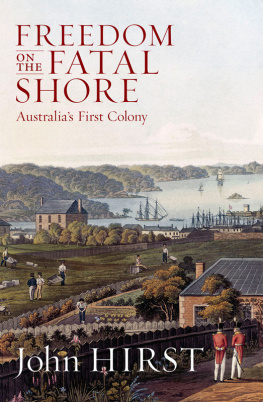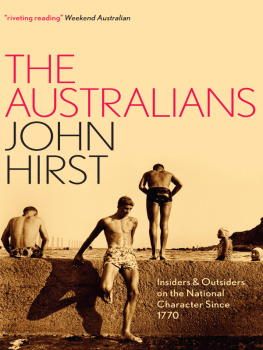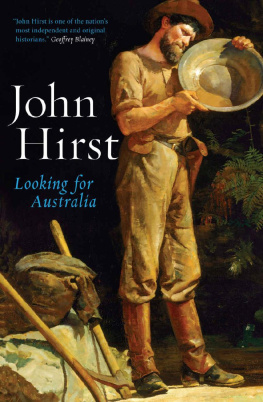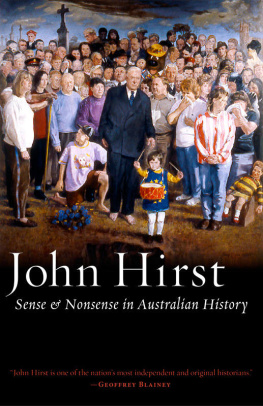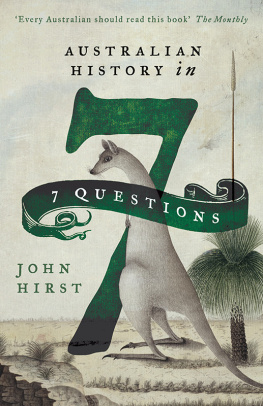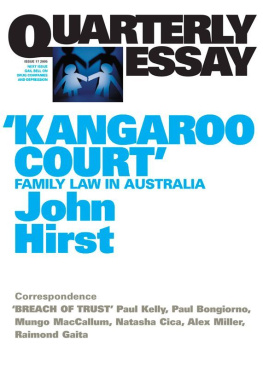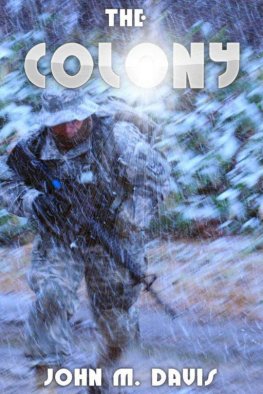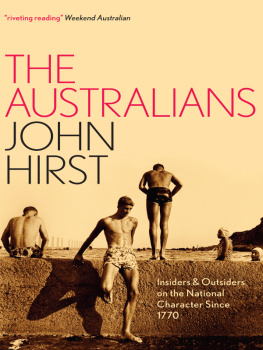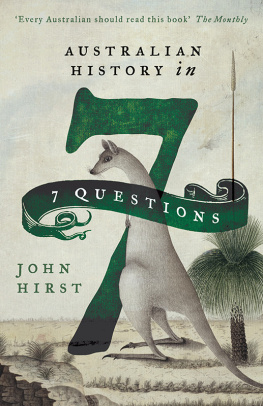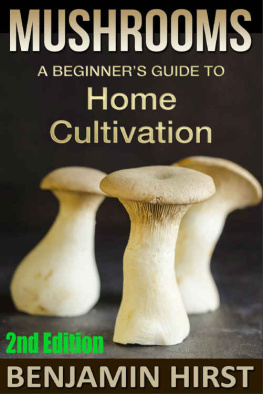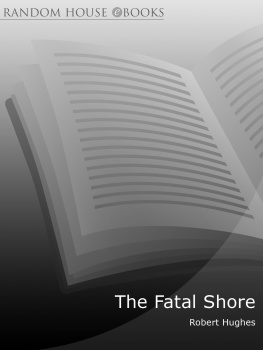John Hirst - Freedom on the Fatal Shore: Australia’s First Colony
Here you can read online John Hirst - Freedom on the Fatal Shore: Australia’s First Colony full text of the book (entire story) in english for free. Download pdf and epub, get meaning, cover and reviews about this ebook. year: 0, genre: History. Description of the work, (preface) as well as reviews are available. Best literature library LitArk.com created for fans of good reading and offers a wide selection of genres:
Romance novel
Science fiction
Adventure
Detective
Science
History
Home and family
Prose
Art
Politics
Computer
Non-fiction
Religion
Business
Children
Humor
Choose a favorite category and find really read worthwhile books. Enjoy immersion in the world of imagination, feel the emotions of the characters or learn something new for yourself, make an fascinating discovery.
- Book:Freedom on the Fatal Shore: Australia’s First Colony
- Author:
- Genre:
- Year:0
- Rating:4 / 5
- Favourites:Add to favourites
- Your mark:
- 80
- 1
- 2
- 3
- 4
- 5
Freedom on the Fatal Shore: Australia’s First Colony: summary, description and annotation
We offer to read an annotation, description, summary or preface (depends on what the author of the book "Freedom on the Fatal Shore: Australia’s First Colony" wrote himself). If you haven't found the necessary information about the book — write in the comments, we will try to find it.
Freedom on the Fatal Shore: Australia’s First Colony — read online for free the complete book (whole text) full work
Below is the text of the book, divided by pages. System saving the place of the last page read, allows you to conveniently read the book "Freedom on the Fatal Shore: Australia’s First Colony" online for free, without having to search again every time where you left off. Put a bookmark, and you can go to the page where you finished reading at any time.
Font size:
Interval:
Bookmark:
BEING
Convict society and its enemies: a historyof early New South Wales (1983)
The strange birth of colonial democracy: New South Wales 18481884 (1988)

Published by Black Inc.,
an imprint of Schwartz Publishing Pty Ltd
Level 5, 289 Flinders Lane
Melbourne Victoria 3000 Australia
email:
http://www.blackincbooks.com
John Hirst, 2008
Convict Society and Its Enemies and The Strange Birth of Colonial Democracy were originally published by Allen & Unwin in 1983 and 1988 respectively.
ALL RIGHTS RESERVED.
No part of this publication may be reproduced, stored in a retrieval system, or transmitted in any form by any means electronic, mechanical, photocopying, recording or otherwise without the prior consent of the publishers.
Illustration on p.1, Carl Friedrich Dietch, Reise nach Neu-Sd Wallis, Leipzig, 1829 p.205, Mitchell Library, Sydney.
Every effort has been made to contact the copyright holders of material in this book. However, where an omission has occurred, the publisher will gladly include acknowledgement in any future edition.
The National Library of Australia Cataloguing-in-Publication entry:
Hirst, J. B. (John Bradley), 1942
Freedom on the fatal shore : Australias first colony /
ISBN: 9781863952071 (pbk.)
Includes index.
Bibliography.
Penal colonies--Great Britain. Convicts--New South Wales--Social conditions. Democracy--New South Wales--History. New South Wales--Exiles. New South Wales--Social life and customs--1788-1851. New South Wales--Politics and government--1851-1891.
994.402
Book design: Thomas Deverall
Typeset by J&M Typesetting Pty Ltd
Freedom on the Fatal Shore reprints my two books on the early history of New South Wales, Convict society and its enemies and The strange birth ofcolonial democracy. Taken together they cover the first hundred years of the colonys history.
The phrase the fatal shore, originally in a convict ballad, has been made famous as the title of Robert Hughes magnificent book on the convict system. The advance publicity for The Fatal Shore had no need to tell lies about it, but it made the claim that this was the first book seriously to examine the convict experience in Australia. I was ropeable. Why was my book Convict society and its enemies, then four years old, being overlooked? When this claim was repeated in a quality newspaper, I determined to write a letter-to-the-editor to correct this error and push my own claims. My wife told me that I should not think of doing such a thing until I had seen the Hughes book. I am very pleased to have followed her advice. In his Introduction Hughes wrote:
Colonial Australia was a more normal place than one might imagine from the folkloric picture of society governed by the lash and the triangle, composed of groaning white slaves tyrannized by ruthless masters. The book that best conveys this and has rightly become a landmark in recent studies of the System is J. B. Hirsts Convict society and its enemies.
The Fatal Shore, sometimes drawing on my work, acknowledges that convicts were not slaves owned by their masters, that they could be punished only by order of the court, that they possessed and claimed various rights which they were very ready to defend, that they were better fed than working people in Britain, that they were not usually called convicts and, finally, that assignment to private masters, which was the centrepiece of the convict system, was by far the most successful form of penal rehabilitation that had ever been tried in English, American or European history. But these acknowledgements come as summary statements; we dont see close up and in memorable detail governors and masters being forced to negotiate with convicts, or convicts working in their own time and making good money, or ticket-of-leave men running their own cattle with their masters. Hughes devotes the greater part of his book to the penal VIII settlements where convicts who committed further crimes were sent: Norfolk Island, Macquarie Harbour, Moreton Bay and Port Arthur. These were horrible places and Hughes words have the power to convey the horrors, fresh and raw. There are pages and pages on the oppressions and floggings; this is what he wants to drill into our memories.
Hughes acknowledges that I discuss the lower depths of the System but suggests that I may have underestimated the moral and human significance of these places. Certainly, he concedes, only a minority of the convicts was sent there but they provided a standard of terror which was designed to enforce good behaviour in all the rest. As in Russia under the communists, only a small fraction of the population had to be sent to the Gulag to keep the rest in line. This slips into equating convict New South Wales with the arbitrariness of totalitarian rule and so denies an important part of its normality. You could be sent to Norfolk Island only by a trial in open court where the standard of proof was beyond reasonable doubt. If everyone lived in the shadow of terror, a convict could not write home, all a man has got to mind is to keep a still tongue in his head and do his masters duty and he is looked upon as if he were at home (which I cite) or I hav got a very good place all the Bondeg I am under is to answer My name Every Sunday before I goes to church so you Mit not think that I am made a Slave of, for I am not, it is quite the reverse of it (which Hughes cites). These convicts no more lived in terror of Norfolk Island than I do of a maximum-security prison. Of course, given who the convicts were, there were plenty who did not want to work or would not accept any authority or could not stop thieving. They could well end up on Norfolk Island or perhaps be kept in some sort of order by fear of it.
None of Hughes acknowledgement of normality disturbs the controlling image of the book: that one society determined on a sort of final solution for crime by shipping its scum to the other side of the world. Scum is his term, which he uses regularly to show how convicts were thought of. But scum is at odds with much of what Hughes reports as the book proceeds like convicts having legal rights and not being called convicts and sometimes a single passage breaks down in contradiction. Consider his treatment of the Second Fleet. Since the convicts are thieves and scum, the government is happy to allow private contractors to ship them to New South Wales and make money out of it. The contractors for the Second Fleet treat the convicts appallingly, and as the dead and dying are carried off the boats in Sydney Cove the contractors open a store selling the food and clothing that should have been supplied to the convicts on the voyage. But when news of this terrible voyage reaches London, there is public outrage and an enquiry, though no one is prosecuted. Soon, however, improvements are made: contractors get paid according IX to how many convicts they land alive in Sydney; doctors are sent with them and finally doctors are given authority over even the ships master to ensure that convict health and well-being are protected. After these changes, it was safer to sail as a convict to Australia than as a free migrant to America. The story, even in Hughes hands, is of humanitarian concern extending to convicts, growing acceptance of responsibility by governments and innovative methods to extend their control. This is the world in which New South Wales took shape; its ruling spirits were not, as Hughes claimed on the first page of his book, Hobbes and Sade.
Font size:
Interval:
Bookmark:
Similar books «Freedom on the Fatal Shore: Australia’s First Colony»
Look at similar books to Freedom on the Fatal Shore: Australia’s First Colony. We have selected literature similar in name and meaning in the hope of providing readers with more options to find new, interesting, not yet read works.
Discussion, reviews of the book Freedom on the Fatal Shore: Australia’s First Colony and just readers' own opinions. Leave your comments, write what you think about the work, its meaning or the main characters. Specify what exactly you liked and what you didn't like, and why you think so.

